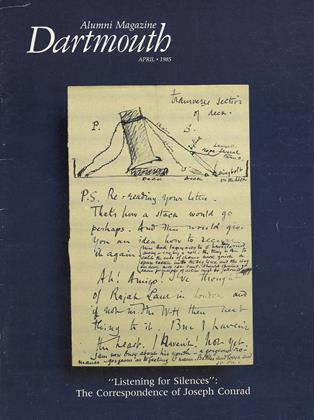"Go directly to jail . . . Collect a friend": This modification of the familiar Monopoly game directive is used as an attention-getting headline on a brochure recruiting volunteers for the Tucker Foundation's prison visitation program.
The volunteers go once a week to one of two correctional facilities in Woodstock and Windsor, Vt. to spend an hour with an inmate.
"What we do is called tutoring," says Margaret Warram '85, present student director of the program. "But we do anything from woodworking to tutoring. We serve as role models, people who have been successful. Sometimes volunteers just sit and talk the whole hour."
gram during her sophomore summer. "After I gave it a try, I loved it," she recalls. She became director last spring. Her duties as director include recruiting volunteers, getting the volunteers to the prison orientation sessions, acting as liaison between the Tucker Foundatioand the prisons, and coordinating transportation schedules.
"We like the students to go to the prisons in groups," explains Warram, "because you really need someone to talk to when you leave. It's a real shock," she says of the knowledge that the inmate has to stay but the visitor can just get up and leave.
Before students start working with a prisoner, they must attend an orientation session. The students are told exactly what they can and cannot do as volunteers, they learn about safety procedures, and they get a tour of the facility. Each Dartmouth student is then assigned one prisoner. The one-on-one involvement and the continuity that is encouraged often lead to real friendship important since many inmates lack loving and supportive families and friends.
Currently there are about 25 Dartmouth students involved with the program, "and maybe ten of those are Bones Gate brothers who are doing it as a house project," Warram notes. That number is higher than it has ever been. Jan Tarjan '74, director of interns and community programs for the Tucker Foundation, recalls the history of the program. She knows that "there were students who went to serve in prisons before I got here because I found some old photos in the archives. But when I came here in 1978 nobody was aware of the program. About 1979-80, a student had a leave term internship at the Windsor facility. I started thinking about Dartmouth students getting involved with the prisons, but the program had several false starts."
John Harris 'B4 is primarily responsible for the program in place today. While Harris was doing the living-andlearning term with Outward Bound, in the winter of 1982, his group decided to work with the prisons for their term project. When the term ended, Harris decided the prison visitations should go on. He turned it into an ongoing project with help from Tarjan.
"I think it's a good learning experience for Dartmouth students," says Tarjan. "I want them to encounter people not too different from themselves, but who have reacted in a different way (such as committing a crime) to social problems." According to Tarjan the number and commitment of the volunteers at Dartmouth are rare. "We're really proud of this program," she says.
Grace Engle at the Windsor prison, has nothing but praise for the program. "I find it really valuable to get ideas and energy from the outside and from the same age range. The guys [both prisons are all male] love it. They listen and ask questions and enjoy knowing people who have an education."
Charlotte Boggs is a teacher at Woods tock. "Our people rise to the occasion,she says. "The Dartmouth students have motivated several of the guys to set their goals higher. I just can't say enough about it."
The students gain a sense of satisfaction, too, but sometimes there are challenges as well. "Almost automatically, the guy falls in love with you," notes Shelley Leavitt 'B5. "A girl comes in to visit them every week, you want to be friendly, but you can't encourage them." Leavitt says she "laid down the law" and "I've never felt threatened; no one has ever laid a hand on me."
She stresses the importance of making a long-range commitment to the program: "You have to be consistent. They depend on you coming every week." Leavitt's prison friend has gotten his high school equivalency diploma since she's been with him. "But my biggest accomplishment," she says, "was finally getting him to admit that he had done something wrong, that the crime was his fault."
Margaret Warrant '85, student director of the Tucker Foundation's prison visitation program,talks with a couple of inmates in the Woodstock, Vt., Correctional Center. The three-year-old program benefits both volunteers and inmates, according to Warrant.
 View Full Issue
View Full Issue
More From This Issue
-
 Cover Story
Cover StoryListening for the Silences
April 1985 By Laurence Davies -
 Feature
FeatureMinimum Standards
April 1985 By Gayle Gilman '85 -
 Feature
FeatureKey to Success: Dartmouth's Athletic Sponsor Program
April 1985 By Jim Kenyon -
 Feature
FeatureHistorical Notes on the Upper Valley
April 1985 By Jerold Wikoff -
 Feature
FeatureFROM THE DESK OF THE PRESIDENT
April 1985 -
 Article
ArticleWorth his salt
April 1985 By JOseph Berman '86








